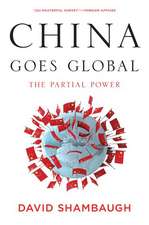The Subtle Logics of Knowledge Conflicts in China’s Foreign Enterprises
Autor Constanze Wangen Limba Engleză Paperback – 12 mai 2016
Preț: 388.52 lei
Nou
Puncte Express: 583
Preț estimativ în valută:
74.35€ • 77.53$ • 61.79£
74.35€ • 77.53$ • 61.79£
Carte tipărită la comandă
Livrare economică 21 martie-04 aprilie
Preluare comenzi: 021 569.72.76
Specificații
ISBN-13: 9783658141837
ISBN-10: 3658141832
Pagini: 324
Ilustrații: XV, 308 p. 6 illus.
Dimensiuni: 148 x 210 x 19 mm
Greutate: 0.43 kg
Ediția:1st ed. 2016
Editura: Springer Fachmedien Wiesbaden
Colecția Springer VS
Locul publicării:Wiesbaden, Germany
ISBN-10: 3658141832
Pagini: 324
Ilustrații: XV, 308 p. 6 illus.
Dimensiuni: 148 x 210 x 19 mm
Greutate: 0.43 kg
Ediția:1st ed. 2016
Editura: Springer Fachmedien Wiesbaden
Colecția Springer VS
Locul publicării:Wiesbaden, Germany
Cuprins
Intermediaries in China’s Foreign Enterprises.- Knowledge Workers in China.- The Property of Knowledge in Chinese Philosophy, History, and Law.- Knowledge Practices and Sino-German Conflicts.- Solutions for Sino-German Knowledge Conflicts.
Notă biografică
Constanze Wang is Global Corporate Communications and Culture Manager for a German engineering company. She is in charge of the company’s integration with the Chinese parent company.
Textul de pe ultima copertă
This book investigates knowledge interactions in China’s foreign enterprises. It reveals that cultural differences strongly account for knowledge-related obstacles, namely knowledge leakage and insufficient knowledge sharing. Contrary to conventional wisdom, however, widespread cultural arguments such as Confucianism or collectivism hardly apply to Chinese employees’ handling of knowledge. In fact, more subtle cultural logics are relevant in daily work, which are connected to the perceived stability of the enterprise itself. But these usually go unnoticed. Thus, rather than being distracted by a national “Chinese culture”, managers can take real action to solve knowledge conflicts in their particular enterprise.
Contents
Constanze Wang is Global Corporate Communications and Culture Manager for a German engineering company. She is in charge of the company’s integration with the Chinese parent company.
Contents
- Intermediaries in China’s Foreign Enterprises
- Knowledge Workers in China
- The Property of Knowledge in Chinese Philosophy, History, and Law
- Knowledge Practices and Sino-German Conflicts
Target Groups - Scholars, lecturers and students in the fields of China studies, business management, sociology, and law
- Managers, investors and consultants involved in foreign business activities in China
Constanze Wang is Global Corporate Communications and Culture Manager for a German engineering company. She is in charge of the company’s integration with the Chinese parent company.
Caracteristici
Publication in the field of social sciences Includes supplementary material: sn.pub/extras














